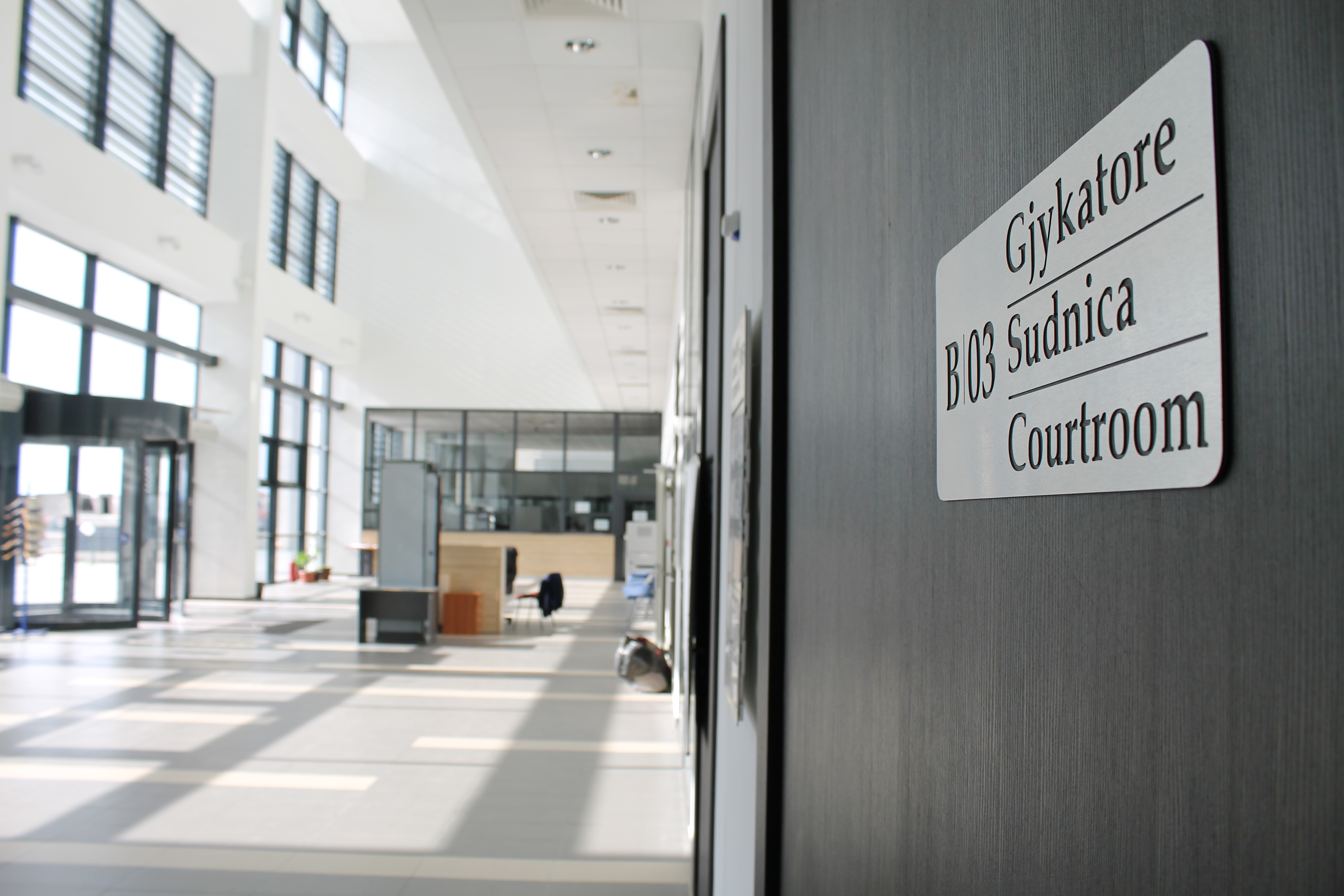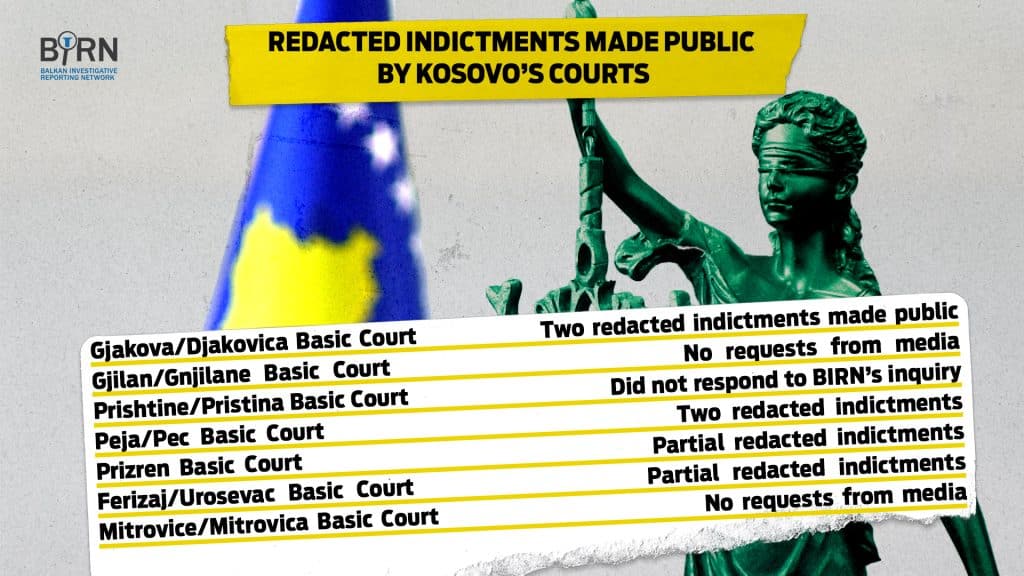In 2022, the law in Kosovo changed to oblige prosecutors to submit redacted indictments to courts for public access, but implementation varies from place to place and some journalists aren’t taking advantage.
Failure to enforce the law leaves the likes of Llozani and his journalism colleagues tapping sources for hard copies of indictments or photographs of certain pages on a mobile phone.
The journalists say they are simply doing their job, but civil society representatives argue such ‘leaks’ risk undermining the integrity of a case.
“This practice can create confusion and undermine the integrity of the judicial process, as incomplete or inaccurate information can affect public perception and the rights of the defendants,” said Mexhide Demolli, executive director of the Prishtina-based NGO Levizja FOL [Movement FOL].
Lack of awareness

Palace of Justice. Photo: BIRN.
The Kosovo judiciary publishes online only verdicts, not indictments, but access can be granted – prior to a verdict – to a redacted indictment, essentially the defendant’s initials, the crimes they are charged with and a brief description of the provisions of the indictment.
Birth dates, addresses, ID numbers and any information that might identify witnesses or undercover investigators remain confidential.
In 2022, Article 237 obliged prosecutors to submit to the courts the redacted versions for public access. But they do not always do so, and journalists appear to be unaware of the right to request them.
The Basic Court in Peja/Pec, western Kosovo, told BIRN it had received two redacted indictments “at the court’s request”. Aside from those cases, it said it had “not received any other redacted indictments under this provision”.
The Basic Prosecution in the city also confirmed it had submitted two redacted indictments of public interest following requests for access.
“We redacted these indictments for the interested parties after the initial review,” the Prosecution told BIRN. “In most cases, when the indictment is still under investigation and there is public interest, we send a redacted version.”
Regional discrepancies in implementation

Infographic: BIRN/Besnik Krivanjeva
The data from courts and prosecutor’s offices show significant regional differences in the implementation of Article 237.
The Basic Court in Prizren, in southern Kosovo, reported that it receives redacted indictments in cases of serious crimes but not when it comes to crimes punishable by less than 10 years in prison.
In Ferizaj/Urosevac, also in the south, the basic court said it had received some redacted indictments from prosecutors and had granted seven access requests.
The Basic Prosecutor’s Office in the town also confirmed that, alongside the full indictment, it submits a second version for public access.
“The Basic Prosecution in Ferizaj has not yet received any requests from journalists seeking access to the document that is submitted along with the indictment”.
In the northern city of Mitrovica, the basic court said the practice of submitting redacted indictments is only partially followed and that, so far, no journalist has requested access.
The Public Prosecutor’s Office in Mitrovica told BIRN: “When access to the indictment is requested, action is taken based on Article 237 of the Kosovo Code of Criminal Procedure regarding the redaction of the indictment, except for cases that are protected by law and are not accessible to the public.”
The Basic Court in Gjilan/Gnjilane, in eastern Kosovo, said that redacted indictments had begun arriving “in recent months”, but that “no requests from the media have been made”.
Similarly, in Gjakova/Djakovica, in the west, redacted indictments have been submitted for public access on only two occasions.
“We have identified only two cases where the prosecutor, along with the indictment, submitted a document allowing public access,” the court told BIRN. “In cases where media access is requested, the court, upon the parties’ request, allows access to the defendant’s initials, the legal qualification of the criminal offence, and a brief description of the charges.”
Media and public access

Media/Ilustration
The apparent absence of requests from journalists to view redacted indictments suggests a low level of awareness about the law change in 2022 or a lack of interest.
In the capital, Prishtina, for example, the Basic Prosecutor’s Office said it has “not received requests from journalists, as such requests are usually directed to the court where the indictment was submitted”. The Basic Court did not respond to BIRN’s questions.
Demolli, of Levizja FOL, said it was vital that journalists exercise their rights.
“This includes submitting formal requests to courts for access to public documents and attending open court sessions,” Demolli told BIRN.
Llozani, the TV Dukagjini journalist, said it was wrong of judges, prosecutors and sometimes lawyers to think that a journalist getting hold of an indictment may influence the course of a case.
“The justice system is independent, and ultimately neither the prosecutor nor the judge decides based on public opinion, but on the law and the facts,” he said.
“Media owners, journalists, and other professionals in our field have sources and communication, which is legitimate and normal, but in some cases, the supply and publication of parts of the indictment happen at a specific time and in a particular form, often with financial, political, or economic interests of the parties involved,” Llozani said, stressing that this was his personal opinion.
Journalists, he said, must stay abreast of legal changes.
“Accurate knowledge of these changes enables them to report responsibly and accurately, ensuring that the public is informed about developments in the justice system,” he said. “This not only contributes to educating citizens but also strengthens their trust in judicial institutions.”
Kosovo’s State Prosecution, in a response to BIRN, confirmed that Article 237 of the Criminal Procedure Code is being applied inconsistently across various prosecution offices.
“Regarding whether prosecutors are applying Article 237 and submitting partially redacted indictments for public access, it appears that in some offices, all prosecutors comply fully, while in others, some do not submit redacted indictments as required,” the State Prosecution said.
In offices where non-compliance has been identified, chief prosecutors have informed the Office of the Chief State Prosecutor that “this issue will be addressed in their meetings with prosecutors, aiming to ensure full compliance with Article 237”.





